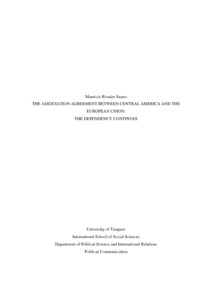THE ASSOCIATION AGREEMENT BETWEEN CENTRAL AMERICA AND THE EUROPEAN UNION: THE DEPENDENCY CONTINUES
ROSALES SUAZO, MAURICIO (2010)
ROSALES SUAZO, MAURICIO
2010
Kansainvälinen politiikka - International Relations
Yhteiskuntatieteellinen tiedekunta - Faculty of Social Sciences
This publication is copyrighted. You may download, display and print it for Your own personal use. Commercial use is prohibited.
Hyväksymispäivämäärä
2010-06-09
Julkaisun pysyvä osoite on
https://urn.fi/urn:nbn:fi:uta-1-20948
https://urn.fi/urn:nbn:fi:uta-1-20948
Tiivistelmä
The historical political relations that identified a cooperating and solidary European Union, a European Union willing to help generate political changes towards a Central America that was living through moments of crisis due to the armed internal conflicts and structural problems, are turned at present to complex relations where the big financial and economic interests of big transnational capital is the priority. It is within this frame that the negotiation process for an Association Agreement between two regions absolutely asymmetric in terms of growth, development and commercial capacity is developing.
This study examines the relations of dependency between the European Union and Central America within the frame of the Association Agreement currently under negotiation. In particular, this work makes a political, critical and chronological analysis of the relations between Central America and the European Union, from the past to the current process of negotiation of the Association Agreement; a process that it is about to conclude in the middle of 2010. It implements a hypothetic deductive method and a documented analysis combined with qualitative research methods.
The study suggests that the conditions of dependency that have characterized the relations between both regions will deepen and that the signing of the Association Agreement will validate the postulates of the Dependency theory within the discipline of International Relations theory.
Although this analysis is not intended to generate new ideas or approaches to Dependency theory, it will certainly open avenues for future works in regards to the impact that such Agreements represent for Central America and their relations with the developed world.
Asiasanat:Central America, European Union, Free Trade, Association Agreement, Dependency Theory, Cooperation, Political Dialogue, Commerce
This study examines the relations of dependency between the European Union and Central America within the frame of the Association Agreement currently under negotiation. In particular, this work makes a political, critical and chronological analysis of the relations between Central America and the European Union, from the past to the current process of negotiation of the Association Agreement; a process that it is about to conclude in the middle of 2010. It implements a hypothetic deductive method and a documented analysis combined with qualitative research methods.
The study suggests that the conditions of dependency that have characterized the relations between both regions will deepen and that the signing of the Association Agreement will validate the postulates of the Dependency theory within the discipline of International Relations theory.
Although this analysis is not intended to generate new ideas or approaches to Dependency theory, it will certainly open avenues for future works in regards to the impact that such Agreements represent for Central America and their relations with the developed world.
Asiasanat:Central America, European Union, Free Trade, Association Agreement, Dependency Theory, Cooperation, Political Dialogue, Commerce
